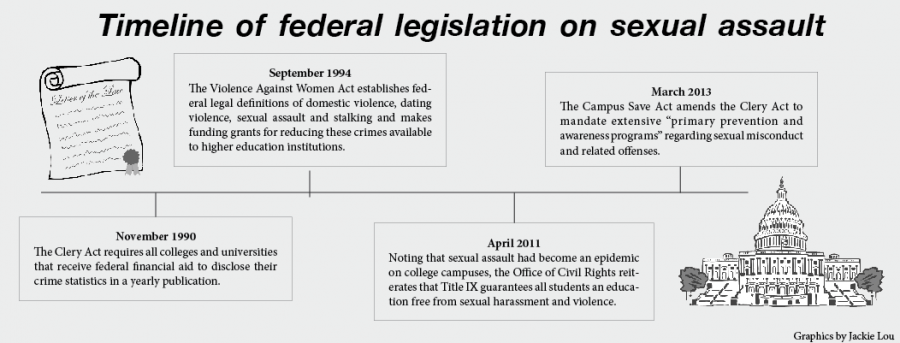Written by Jenna Marvet
Published in the November 6, 2015 issue
In early October, California Governor Jerry Brown passed legislation to require sexual assault prevention classes based on the “Yes Means Yes” bill. This bill mandates the steps schools must take when an instance of sexual assault is reported and tries to clearly define what a “yes” to sex is. The mandatory curriculum is an innovative, positive step in preventing campus sexual assault before the student even steps on a college campus.
Although more movements and changes from university groups have began to appear, most proposed solutions educate students after they are in college and therefore do not effectively prevent sexual assault. Educating students before they reach college, statistically the time at which they are most vulnerable to sexual assault, is the best solution. According to the Bureau of Justice Statistics National Crime Victimization Survey, college-age females are most likely to experience sexual assault among all other age groups. Rather than haphazardly holding education programs after sexual assault is already present, the mandated program will hopefully create a stronger base to build upon before students are most vulnerable.
Over the years, similar curricula have been tested on pre-college-age students and have succeeded. The National Institute of Justice’s “Shifting Boundaries,” a sexual violence and harassment prevention program implemented in middle schools in New York City, included classroom curricula similar to what the “Yes Means Yes” education will include. After the program, there was a 32 percent reduction of sexual victimization frequency by a peer and a 35 percent reduction after a six-month follow-up. If the new California laws can mandate comparable sexual assault education in schools, it is likely that there will be similar results in victimization reduction.
Despite the encouraging nature of the bill, sexual education still remains optional to students. Although comprehensive sexual education will become mandatory for all schools in California on Jan. 1, parents will still be able to opt their children out of these classes. The “Yes Means Yes” program must be mandatory for all students in order to promote an equal education on sexual assault and harassment. Sexual assault prevention is not about the individual, but instead centers on building a community in which bystanders know how to stand up for victims, victims are not shamed and predators are not congratulated. To build that community, there cannot be people opting out of the process.
Too often, programs are labeled as prevention tactics when the damage has already been done. “Prevention” on college campuses currently begins when a victim speaks out or a survey shows a large number of sexual assault victims. “Yes Means Yes” education will take a step ahead and actually have the chance to prevent sexual assault. When a child is taught consent from a young age, the lesson will stick and become automatic. The new mandated education will be a positive step in preventing sexual assault on campuses in the future.












